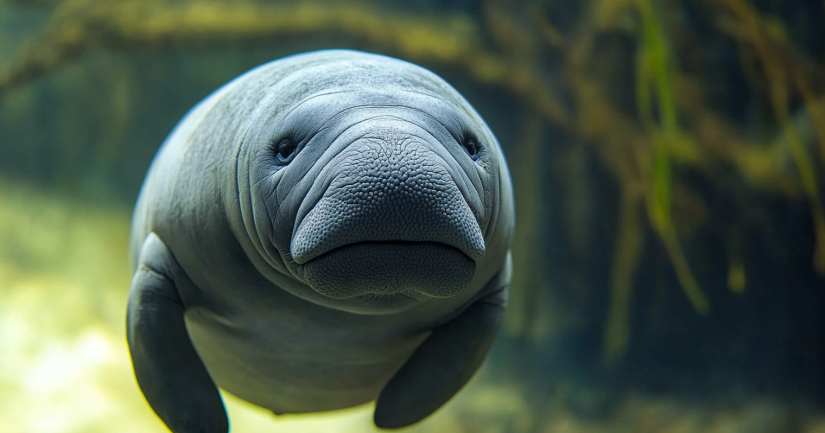
Manatee Quiz , Test Your Knowledge of the Gentle Giants of the Sea! Slow-moving, peaceful, and incredibly lovable, manatees are some of the most fascinating marine mammals in the world. Often called “sea cows”, these gentle giants glide gracefully through warm coastal waters, rivers, and estuaries, feeding on seagrass and captivating everyone who encounters them. Despite their calm nature, manatees are highly intelligent, socially complex, and play a crucial role in their ecosystems. But how much do you really know about these endangered marine mammals? Take our Manatee Quiz to test your knowledge and discover surprising facts about these aquatic wonders!
Manatees belong to the order Sirenia, a group of marine mammals that includes the dugongs and their extinct relatives, the Steller’s sea cow. These creatures have been around for millions of years, but unlike most ocean animals, they are strictly herbivorous, grazing on vast amounts of seagrass and aquatic plants each day.
Manatees are fascinating gentle giants, but there’s even more marine life to discover! Check out our deep dive into the Mackerel Quiz for another ocean marvel, or uncover the mysteries of the long, slender Oarfish Trivia.
Mind-Blowing Manatee Facts That Might Surprise You
- Manatees Are Closely Related to Elephants – Despite living in the water, their closest relatives are elephants, not whales or dolphins! They even have fingernail-like structures on their flippers, similar to an elephant’s toenails.
- They Can Hold Their Breath for 20 Minutes – Although manatees are mammals that breathe air, they can stay submerged for up to 20 minutes while resting underwater.
- They Consume Massive Amounts of Food – A manatee can eat up to 10-15% of its body weight in seagrass daily, making them essential for keeping underwater ecosystems in balance.
- Manatees Are Surprisingly Fast Swimmers – Despite their slow-moving reputation, manatees can reach speeds of up to 20 mph (32 km/h) in short bursts when they need to escape danger.
- They Communicate Using High-Pitched Sounds – While mostly silent, manatees use chirps, whistles, and squeaks to communicate with each other, especially between mothers and calves.
- Manatees Are Highly Endangered – Due to boat collisions, habitat destruction, and pollution, manatee populations have significantly declined, leading to conservation efforts worldwide.
Manatees and Conservation Efforts
Manatees face numerous threats, including climate change, loss of seagrass beds, and water pollution. One of the biggest dangers to manatees is boat strikes, as they often swim close to the surface and struggle to avoid fast-moving vessels. Conservationists have worked hard to protect their habitats, implement speed limits in manatee zones, and raise awareness about these gentle creatures.
Are You Ready to Take the Ultimate Manatee Quiz?
If you love marine life, ocean conservation, and wildlife trivia, this Manatee Quiz is perfect for you! Whether you’re an animal lover, a marine biology enthusiast, or just curious about these incredible sea mammals, this quiz will challenge your knowledge and teach you new facts about one of the ocean’s most beloved creatures.
So, are you ready to dive into the world of manatees and test your knowledge? Take the Manatee Quiz now and see if you’re a true sea cow expert!
Love the ocean? Test your knowledge with the Guess the Sea Animal Quiz, discover your marine match in the What Sea Animal Am I Quiz, or explore more Marine Quizzes for underwater fun!
Manatee – FAQ
A manatee is a large, aquatic herbivore, often referred to as a “sea cow.” These gentle creatures primarily inhabit shallow coastal waters and rivers in warm regions, particularly in the Caribbean Sea, the Gulf of Mexico, and the southeastern United States. They thrive in areas with abundant seagrass and freshwater vegetation.
Manatees are primarily herbivorous, feeding mainly on seagrasses, algae, and other aquatic plants. They are known to consume up to 150 pounds of vegetation daily. Manatees graze by using their muscular lips to grasp and pull food from the seabed. Their slow, deliberate movements allow them to efficiently navigate through their preferred habitats.
Yes, manatees are considered a vulnerable species, with populations threatened by habitat loss, watercraft collisions, and entanglement in fishing gear. Additionally, pollution and climate change further jeopardize their habitats. Conservation efforts are essential to protect these gentle giants and their ecosystems.
Manatees communicate using a variety of vocalizations, including chirps, whistles, and squeaks. These sounds serve different purposes, such as signaling distress, attracting mates, or maintaining social bonds. They may also rely on body language, such as swimming close together or touching, to convey their feelings.
Individuals can contribute to manatee conservation by being mindful of their boating practices, adhering to speed limits in manatee zones, and reporting injured or distressed manatees to local authorities. Additionally, supporting wildlife organizations and promoting awareness about the importance of protecting aquatic ecosystems can significantly aid in preserving these magnificent creatures.
